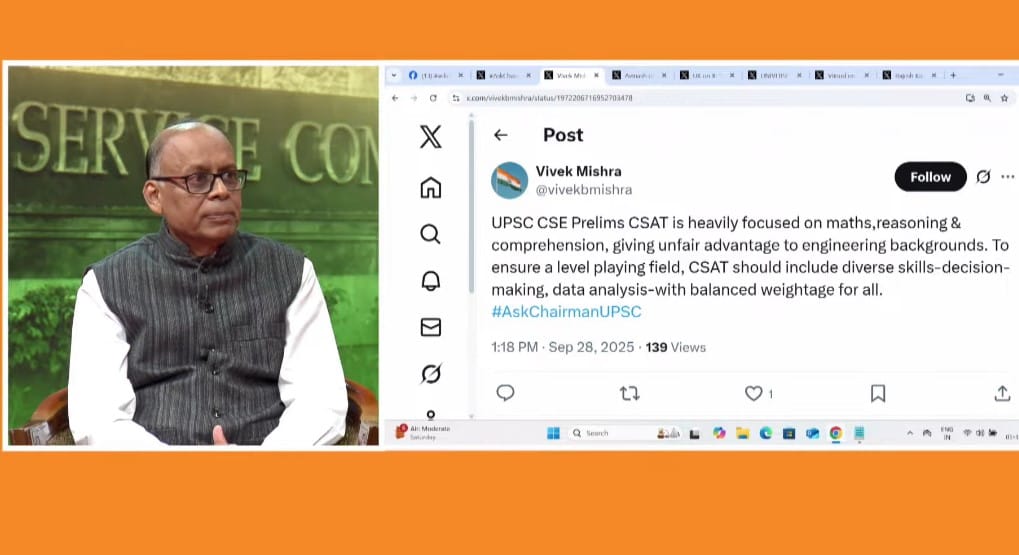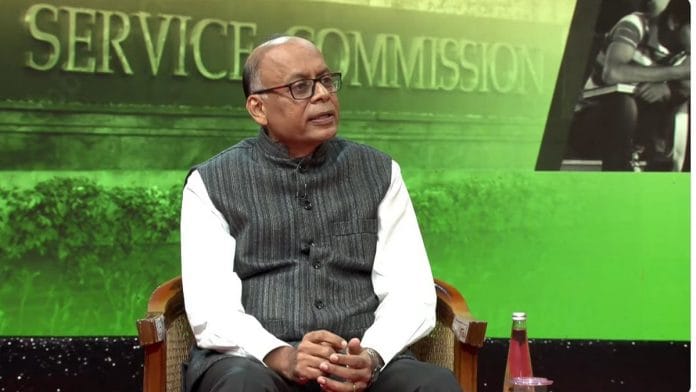New Delhi: Most UPSC candidates now come from small-town India. And coaching or academic discipline don’t have much to do with cracking the exam, according to UPSC chairman Ajay Kumar.
“Today, 80-90 per cent of candidates come from tier-2 and tier-3 cities. Many from difficult circumstances are getting selected; there are countless stories of success,” he told aspirants in a live session on the YouTube channel of DD News.
During the hour-long live-streamed programme on Wednesday, he fielded a range of questions from civil services aspirants — from the prelims answer key and optional subjects to age limits, number of attempts, and reforms.
When one aspirant argued that the Civil Services Aptitude Test (CSAT) is too heavily focused on maths and gives “an unfair advantage to engineering backgrounds,” Kumar emphasised that merit alone decides success in civil services, not background, coaching, or academic discipline.
“UPSC is totally neutral; it doesn’t have any preference for any discipline. Evaluation is anonymous. Many engineering students actually qualify through non-engineering optionals,” he said.
On hot-button issues, he confirmed there is no proposal to change age or attempt limits, explained the role of optional subjects in evaluating a candidate’s understanding, and reiterated the UPSC’s zero-tolerance stance on cheating, with technology like facial recognition being used to curb malpractice.
Also Read: A century of UPSC. A ‘colonial tool’ rewired by protests, committees, even scandal
Rule changes off the table
The question that came up most frequently was about the prelims answer key — why UPSC does not release it immediately after the exam.
“We have a portal where candidates can send suggestions and inputs. These are handed over to experts, and if anyone has an issue with a question, they can raise it there. We release the final answer key before the next exam so that aspirants can prepare accordingly,” said Kumar.
Another recurring query was whether the optional subject in mains could be removed. The UPSC chairman, however, was unequivocal about the mains being a key way for candidates to show their mettle.

“We have 48 optional subjects and each candidate chooses one they are comfortable with. This allows us to test their depth of knowledge and ability to perform in their chosen subject, which is very important for evaluation,” he said. “These skills are useful in service as well.”
Aspirants keep pushing for extra attempts and a higher age bar. Those demands have worked before, most recently in 2014. But Kumar was clear that the rules are settled and won’t change in the foreseeable future.
“There are different views, but we don’t have any proposal to change the age limit or number of attempts. These things have reached a stable situation,” he said. “Earlier there were three attempts and the upper age was 26; now, for the general category, it is six attempts and 32 years. For OBCs, nine attempts; and for SC/ST candidates, unlimited attempts,” he explained.
Also Read: Nehru rejected it, Bose cracked it, RC Dutt served in it. Nationalists and the ICS
‘I did not take any coaching’
On questions about whether a candidate’s background influences interviews, Kumar said UPSC’s system ensured neutrality.
“The background of a candidate has nothing to do with the outcome. The board is designed to be unaffected by such factors. I have had the data checked — there is no difference. Those who perform well in written exams also tend to do well in interviews. If we ever come across bias, action will be taken,” he said.
The Rs 3,000-crore UPSC coaching industry is going strong on the dreams of millions of aspirants, but Kumar insisted that such training is not necessary to succeed.
“You can take my example — I did not take any coaching. Every year, many candidates clear on the basis of self-study. The syllabus is such that you don’t need coaching for it,” Kumar said.
Fairness was a topic that came up often, whether it was the question of coaching advantage, academic background, or the evaluation of papers. In optional papers, Kumar noted, fairness rests on multiple safeguards, from expert examiners to moderation across subjects.
“We have top experts to evaluate papers, and even after that there are two levels of rechecking. Since candidates choose different subjects, we apply a moderation formula to ensure fairness and create a single merit list,” he said.
On cheating and fake certificates, Kumar reiterated UPSC’s strict approach and cited the controversial case in which successful aspirant Puja Khedkar allegedly gave the exam 12 times and falsified documents.
“We have zero tolerance for cheating. We are introducing facial recognition and other technologies to prevent such issues. The Puja Khedkar case is in court,” he said.
Finally, on complaints and grievances, he acknowledged the need for better support.
“There is scope for improvement. We do have a help desk, but it is active only during exams. We are planning to make it functional year-round,” Kumar said.
The UPSC chief closed the session by underlining the scale and credibility of the exam itself. More than 12 lakh candidates apply each year, it is conducted in 22 constitutional languages (23 in total), and across 48 optional subjects.
“It is like Mumbai’s dabbawalas — despite the scale and complexity, every candidate gets exactly their own paper, not someone else’s,” he said.
(Edited by Asavari Singh)






